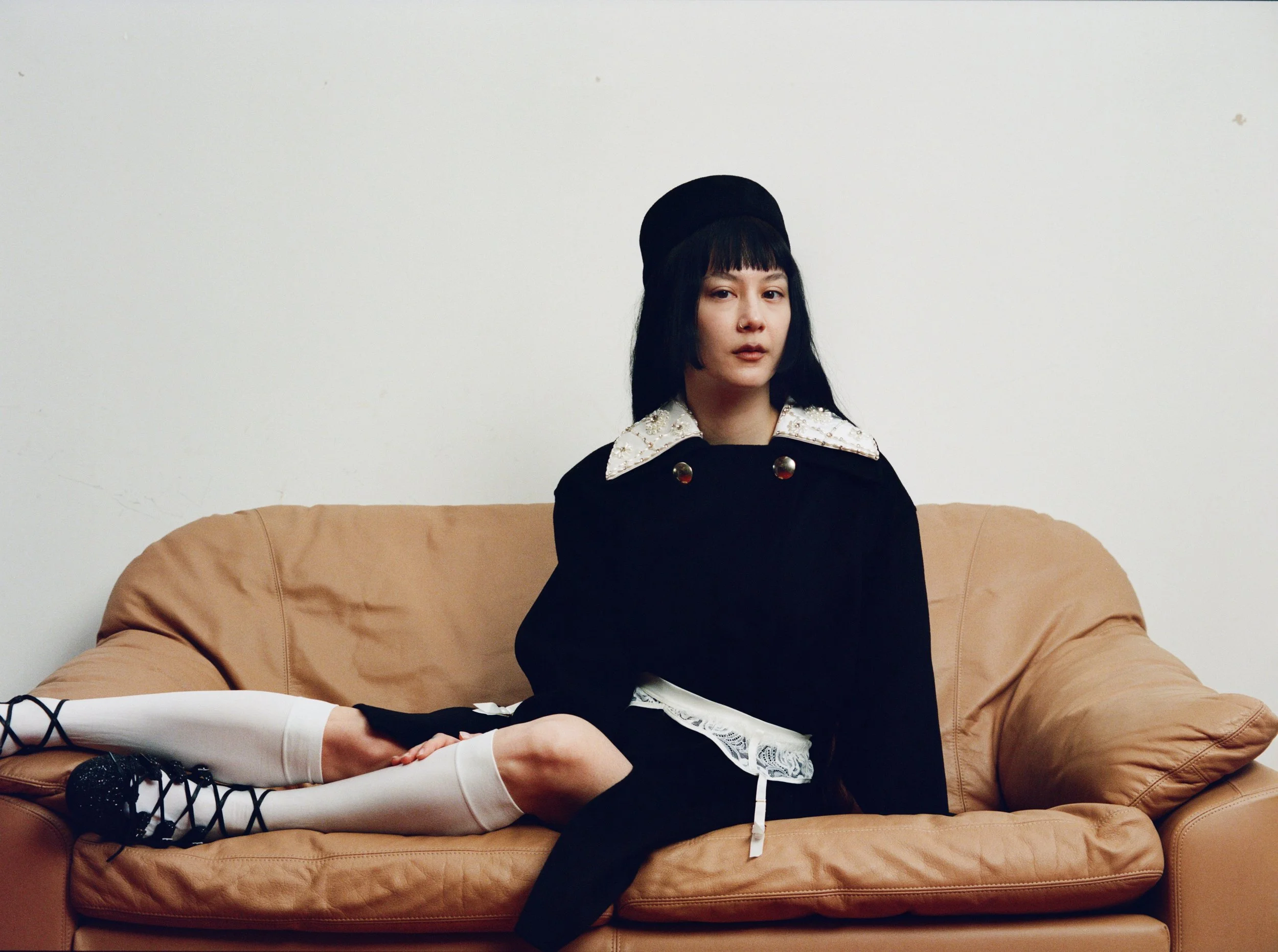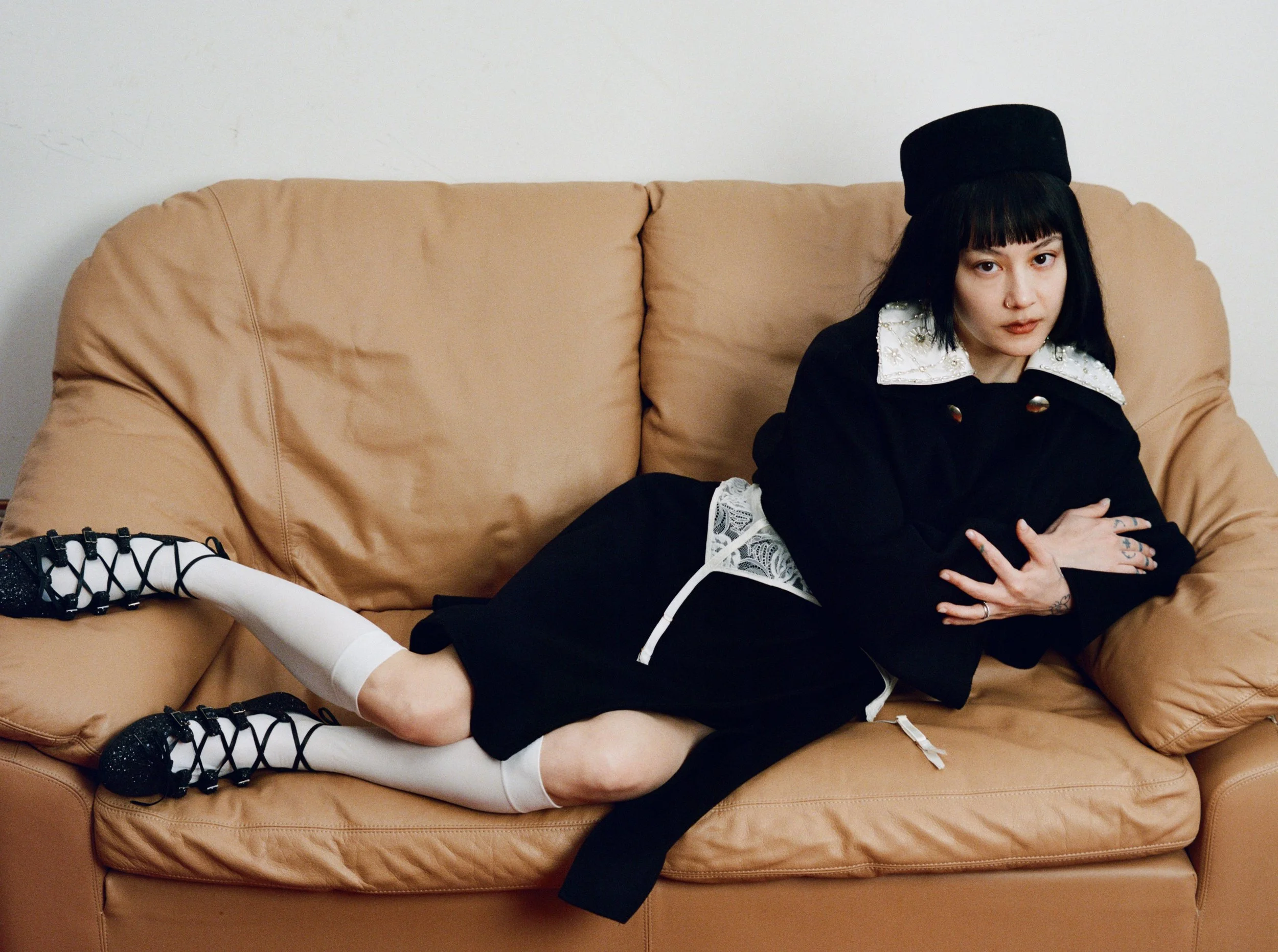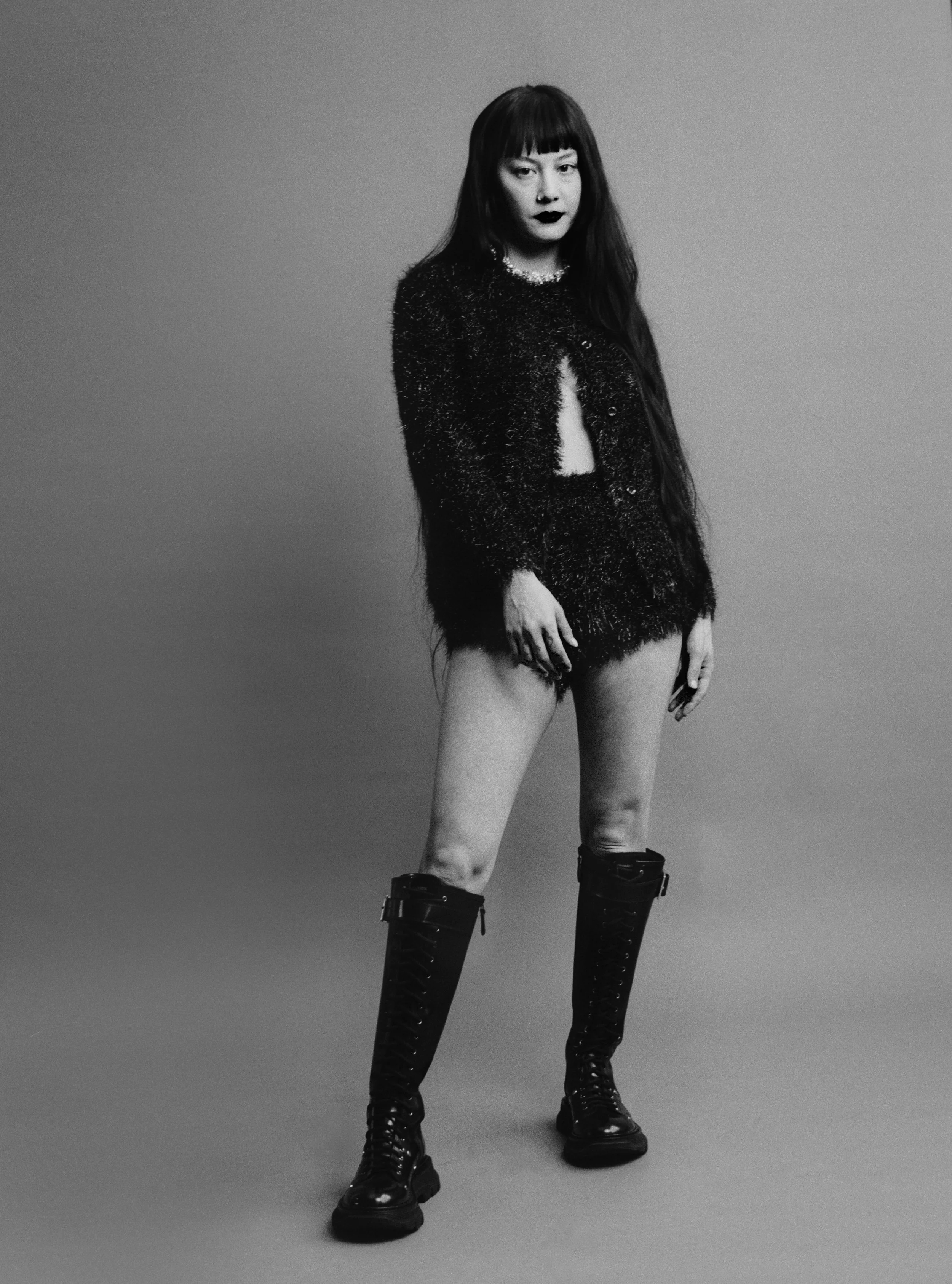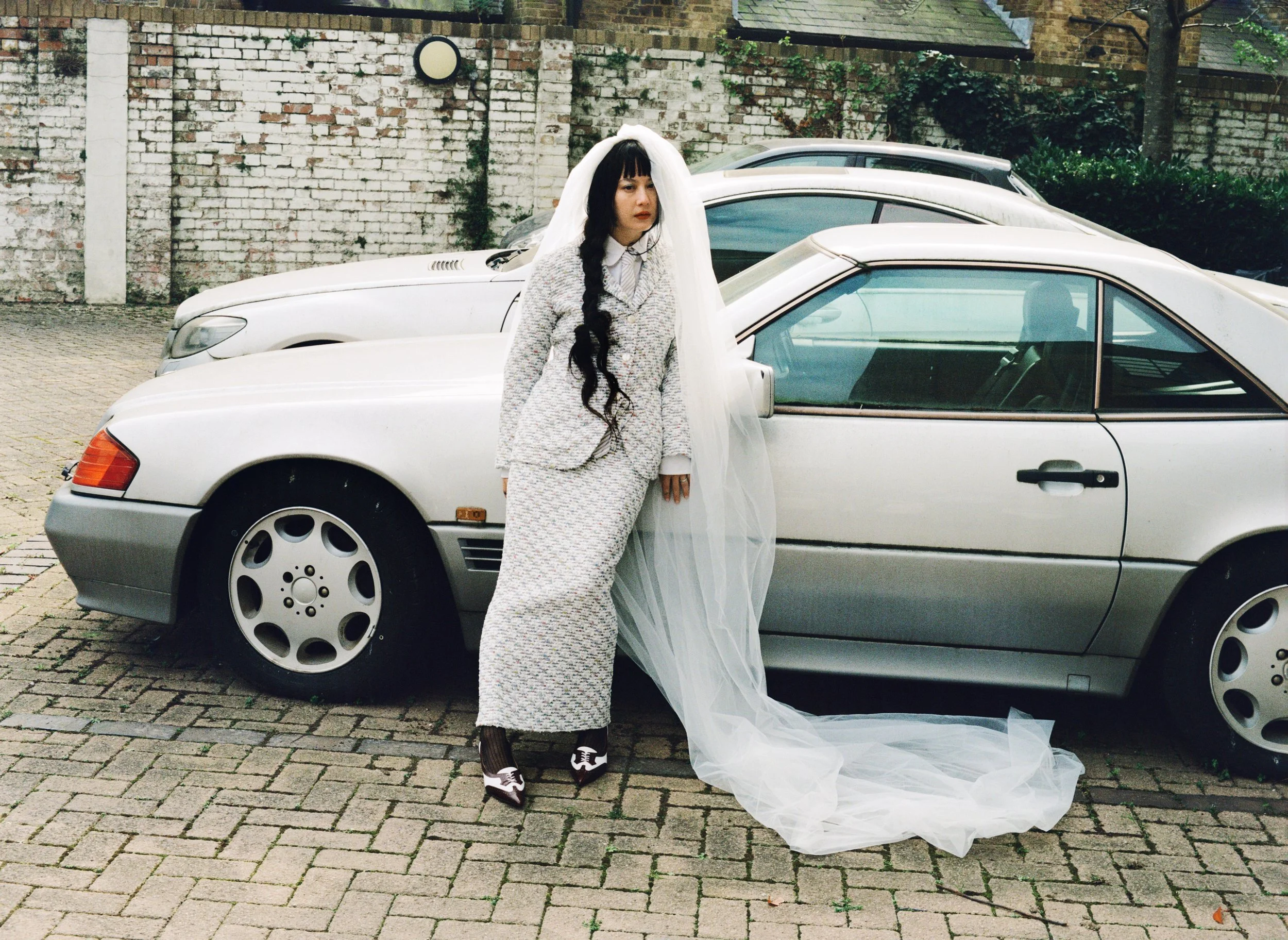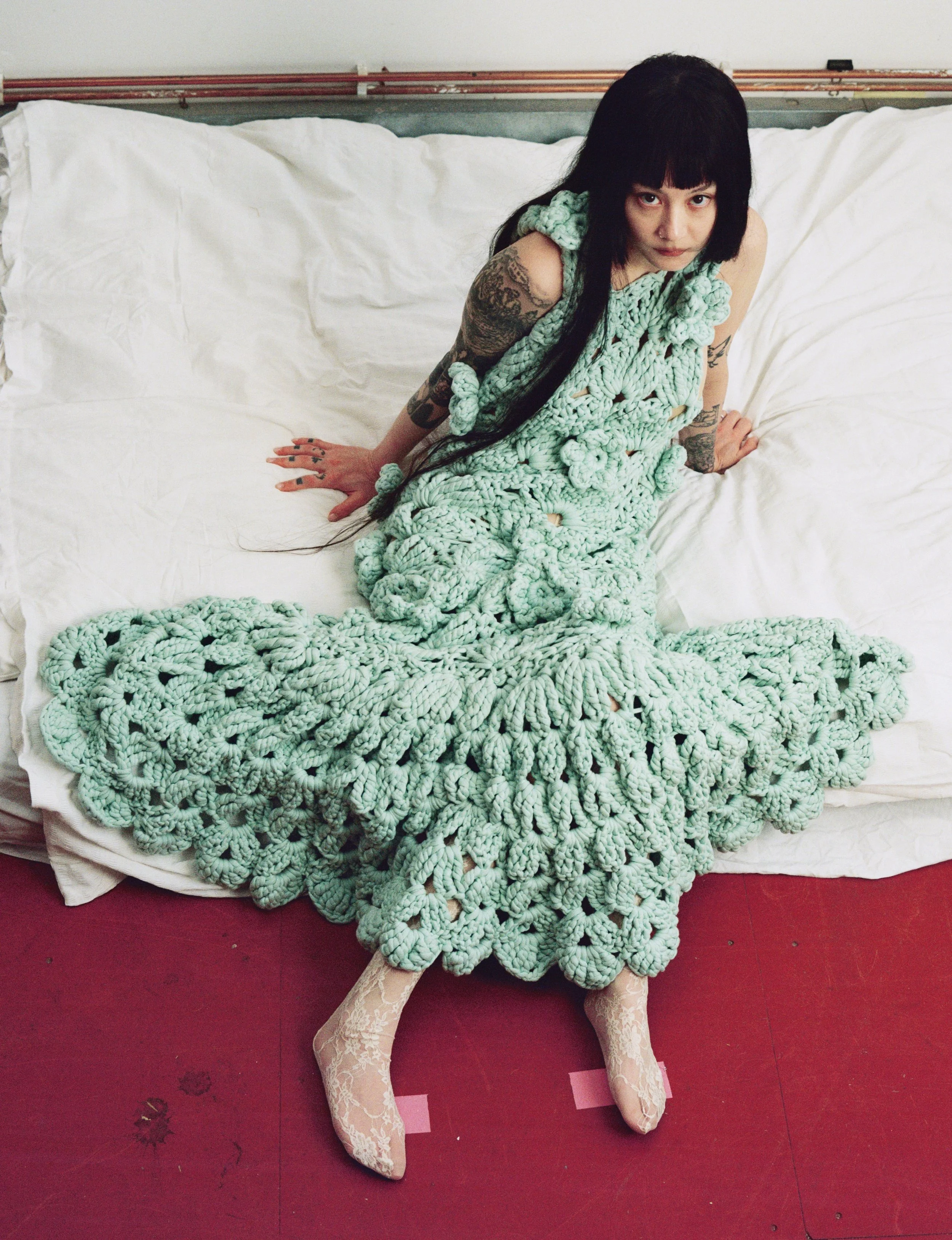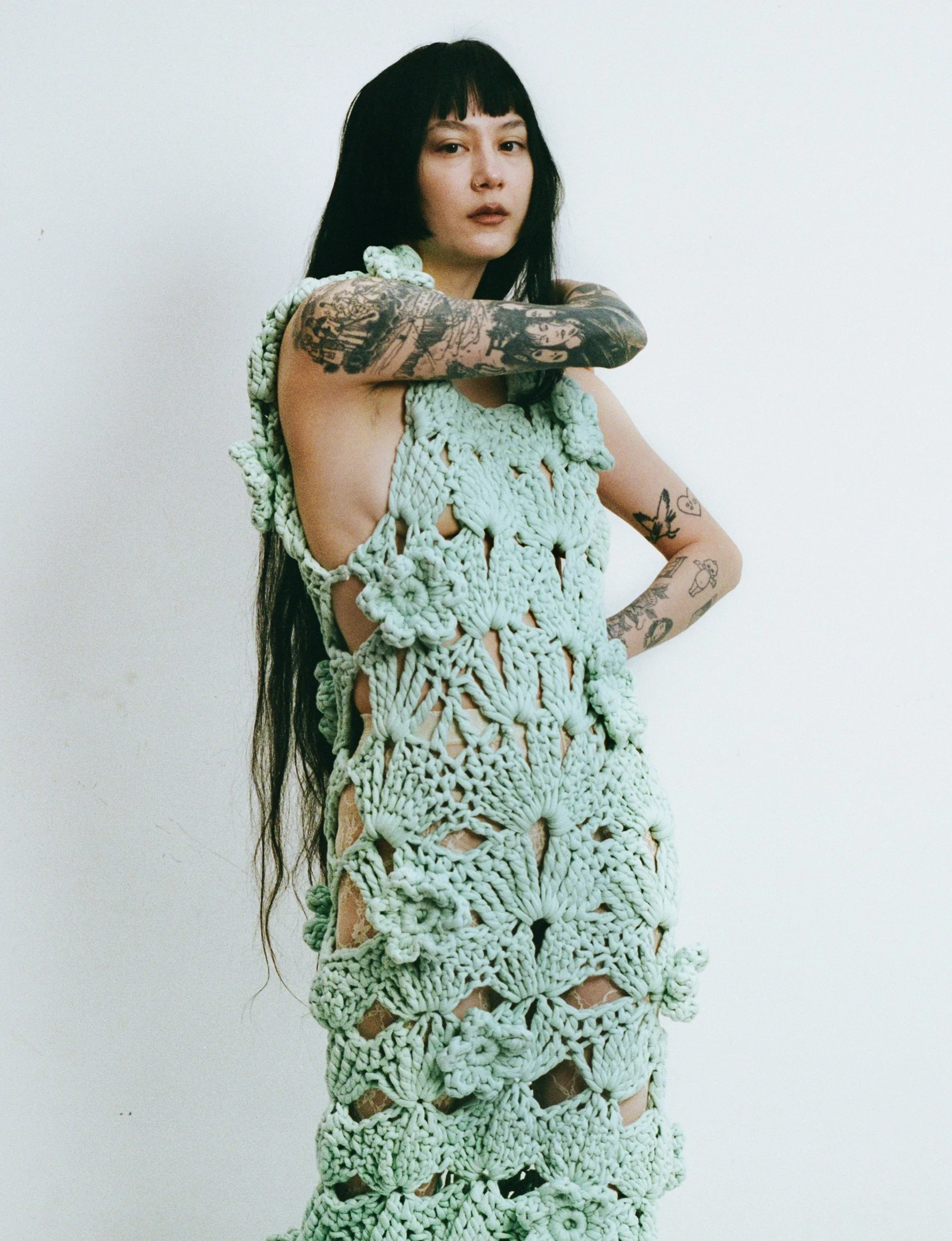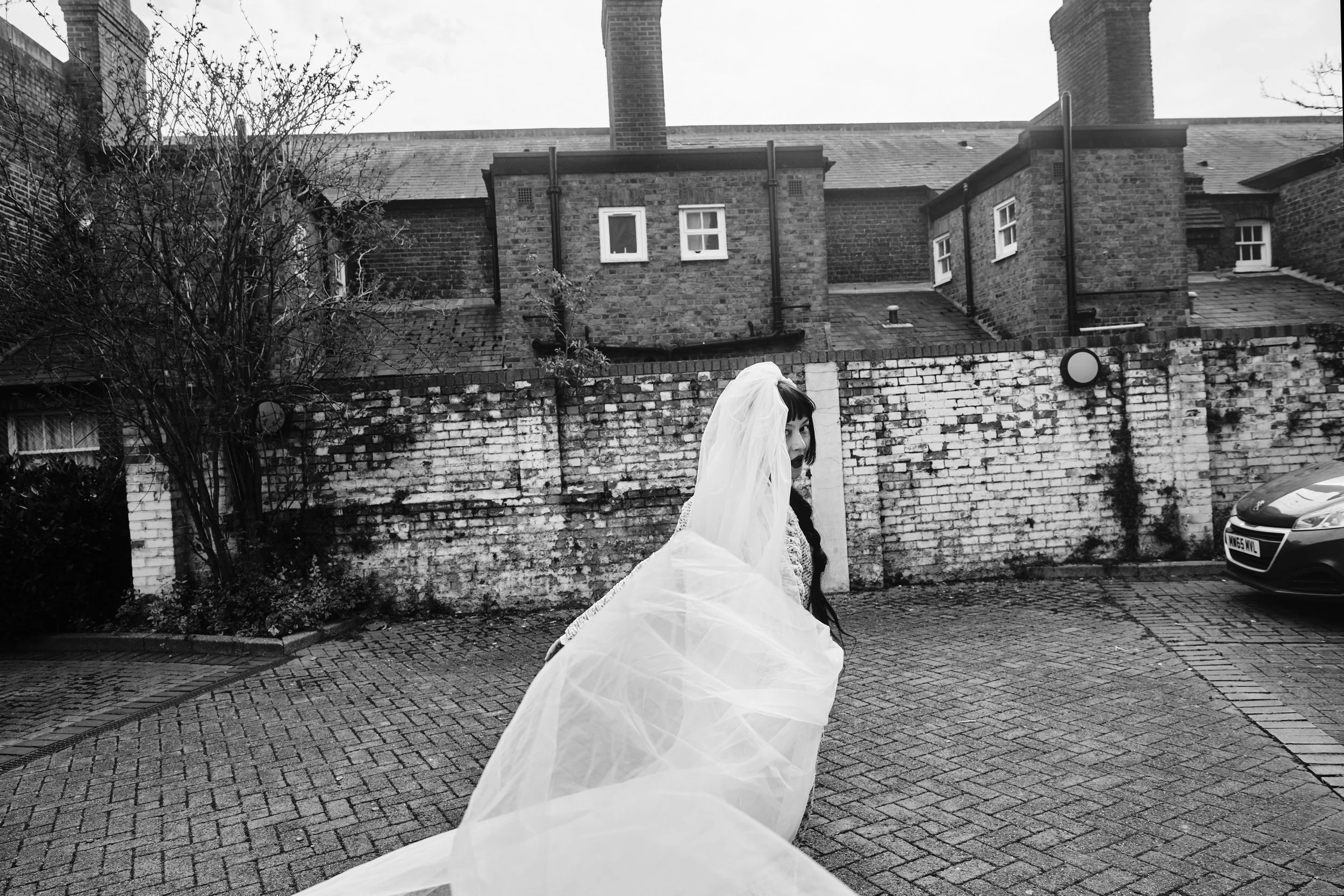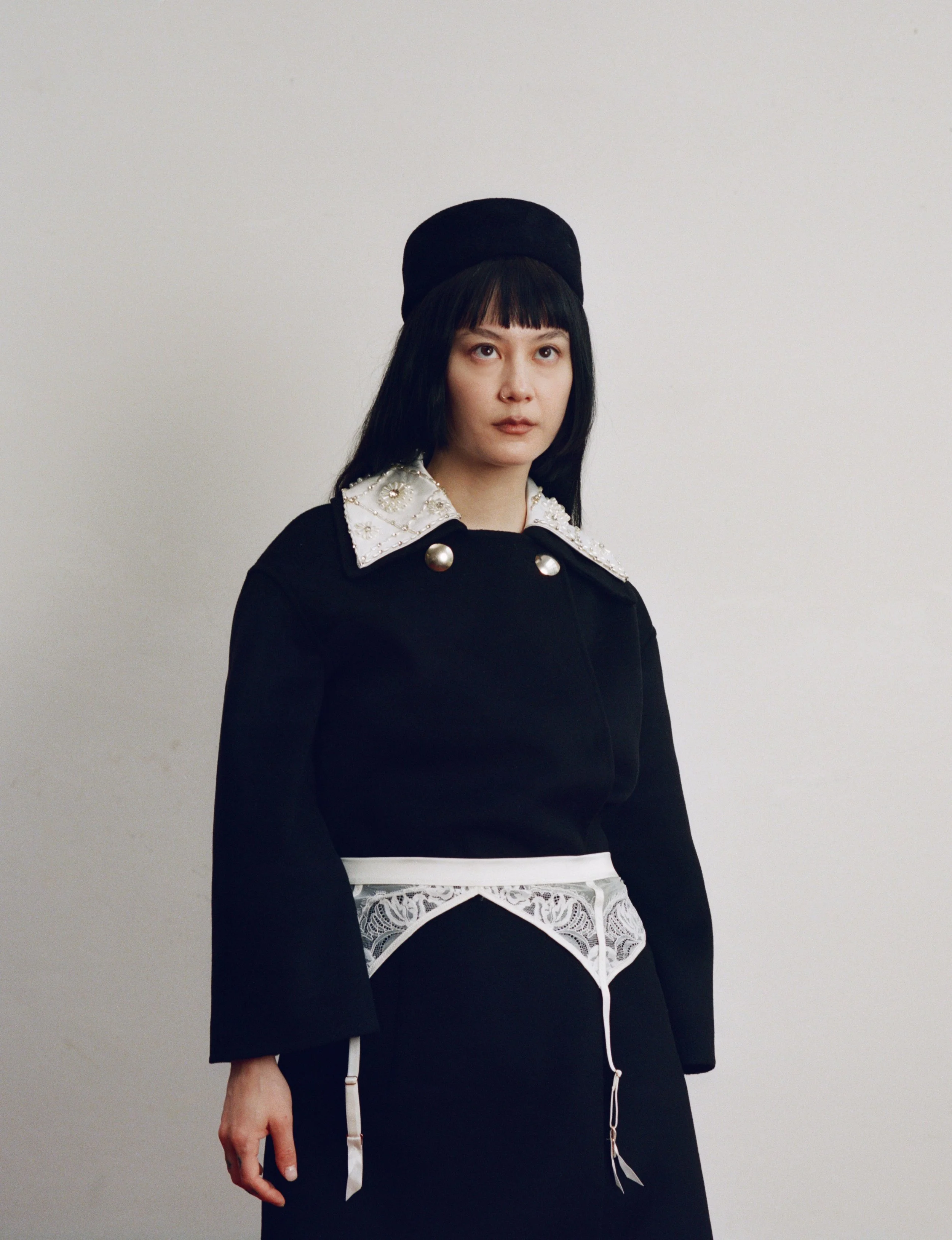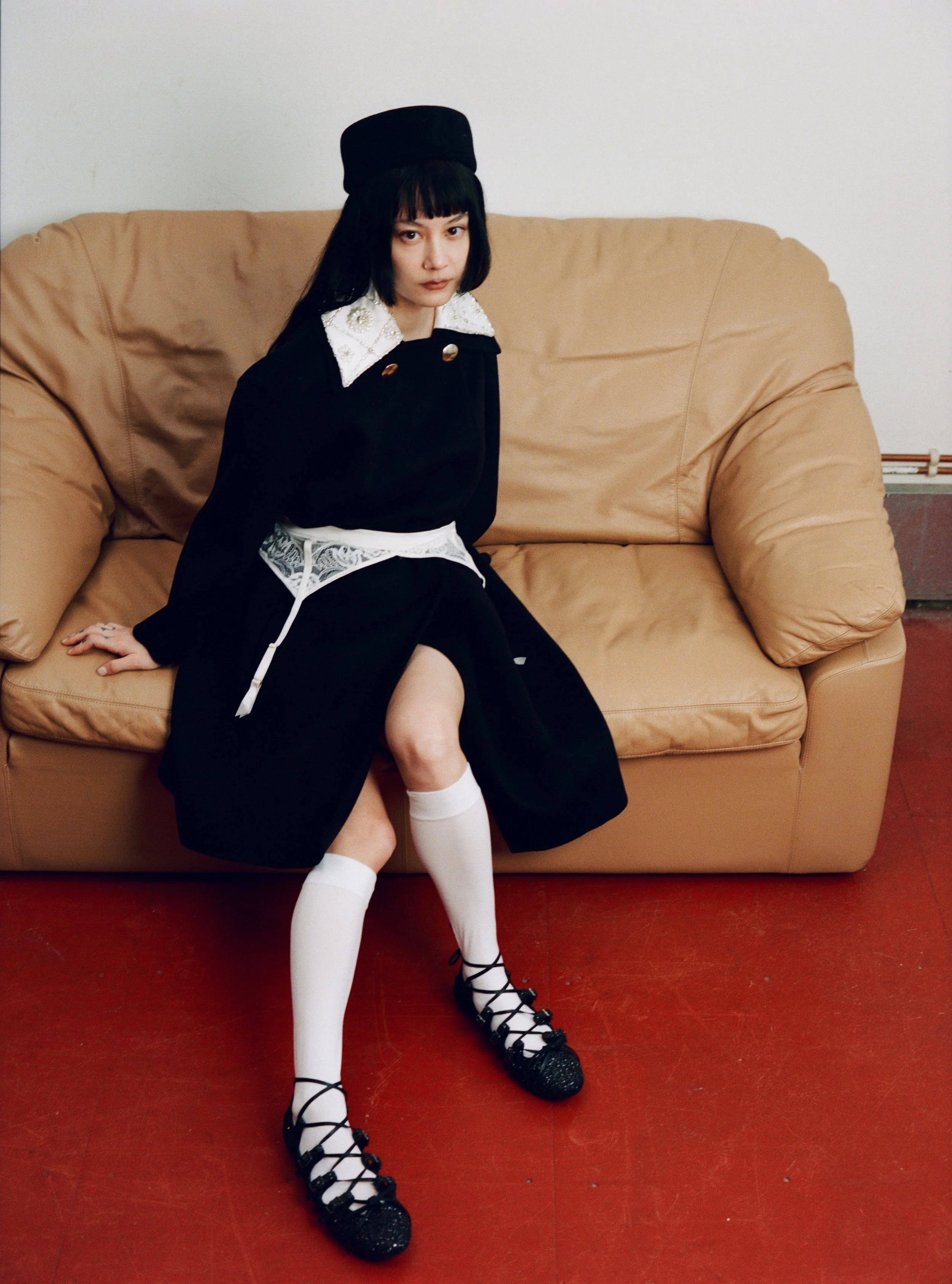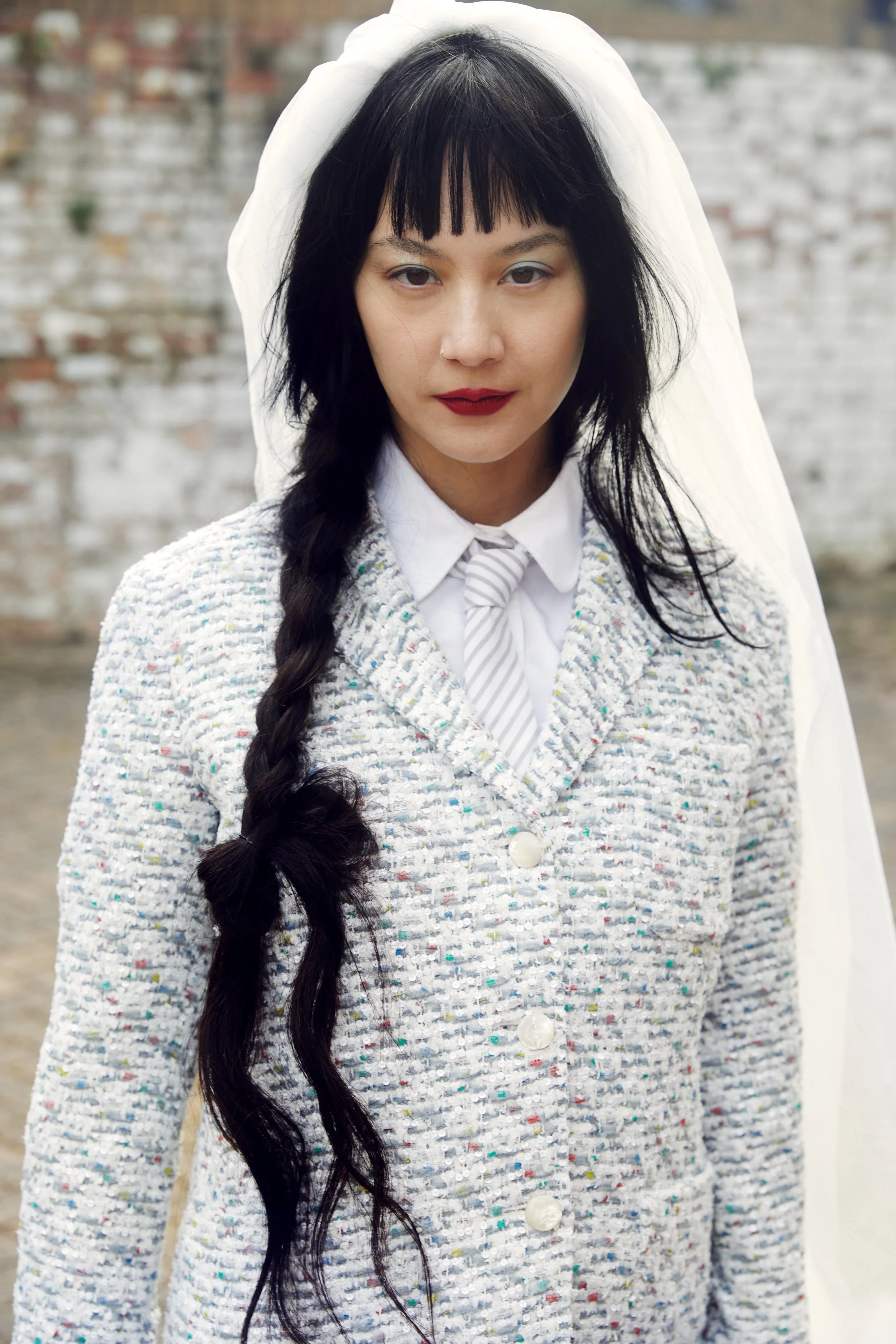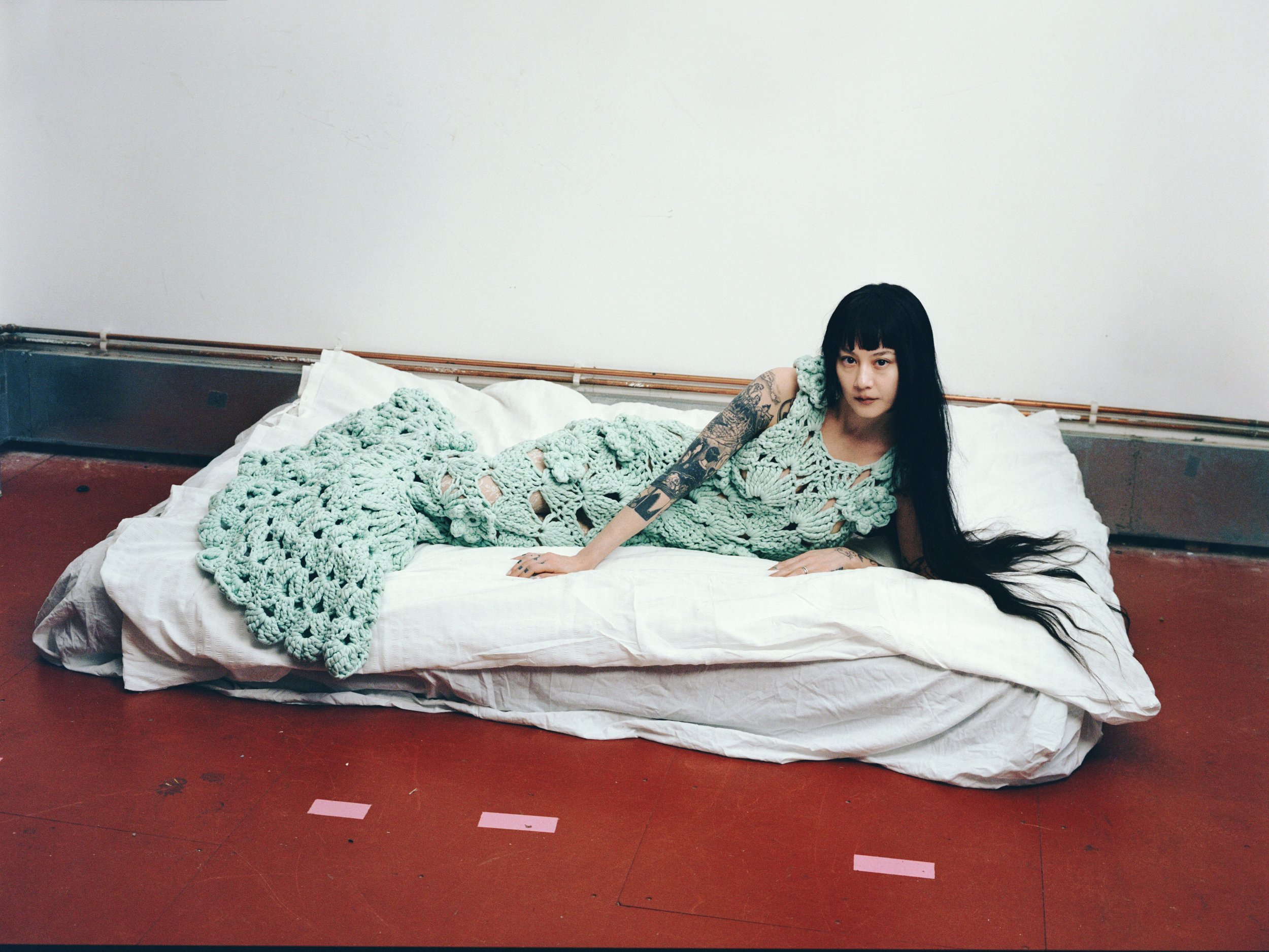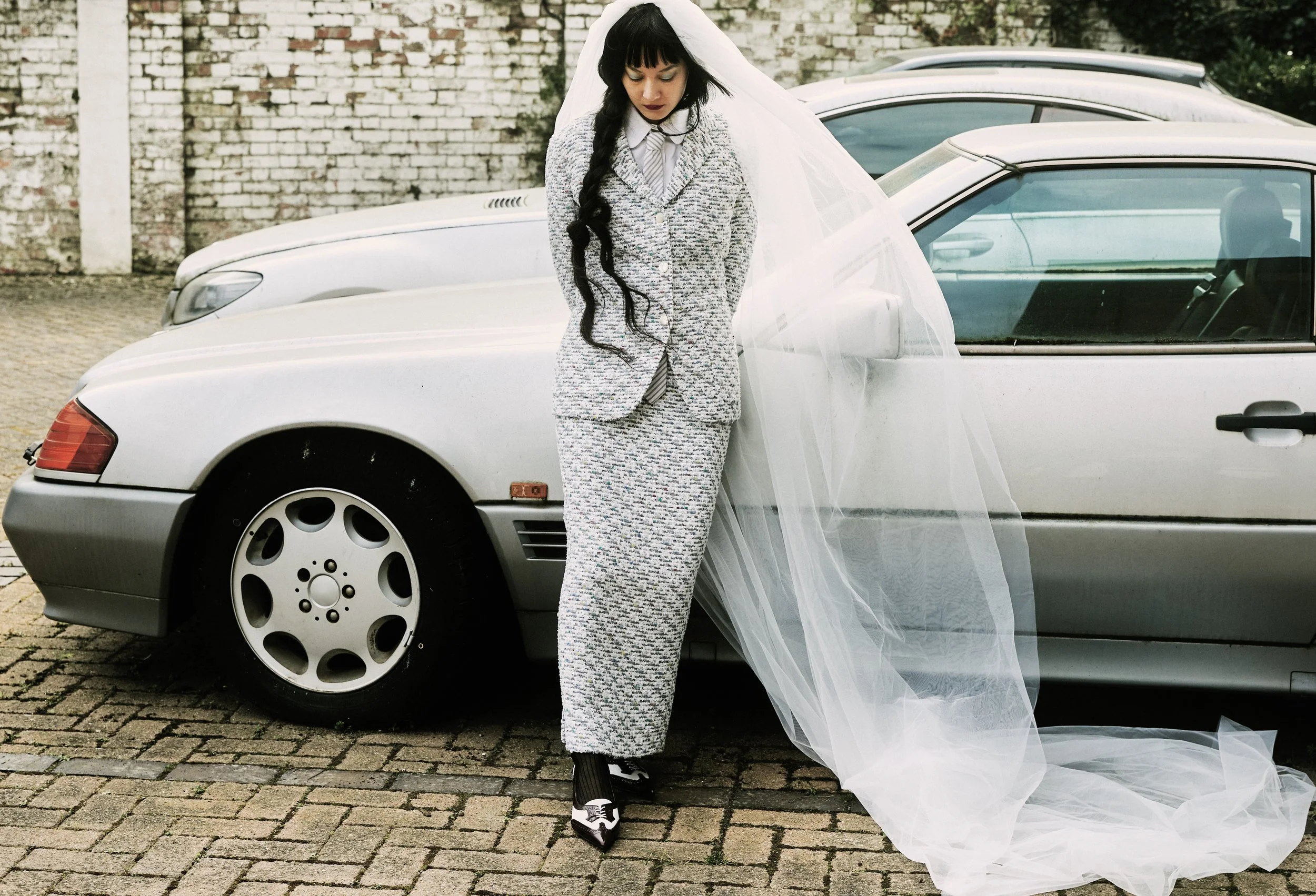Japanese Breakfast’s Michelle Zauner on Sylvia Plath, Siren Songs and Self Mythologising
Words: Sihaam Naik | Photographer: Nicole Ngai | Makeup: Grace Ellington | Hair: Christos Bairabas | Styling: Katy Cutbirth | Photo Assist: Zac Marouche | Styling Assist: Michael Sweeney | Video: Charlotte Amy Landrum
Michelle Zauner is crafting modern mythology. Throughout our conversation for Polyester, she is engaged, inquisitive, and compelling, much like she is on the album—an artist who, like a siren, lures listeners back the moment the music fades. You might know and love her as the visionary frontwoman of the indie shoegaze band Japanese Breakfast, whose lush, evocative albums have become the soundtrack for a generation of dreamers and yearners- or from her bestselling memoir, Crying in H Mart, a poignant exploration of grief, identity, and Korean food,Her last album, Jubilee, was a blend of alternative pop and rock, earning two Grammy nominations and featuring a striking cover adorned with golden persimmons. A distinct iconography runs through her work, and her latest album, For Melancholy Brunettes (and Sad Women), is no exception: its cover art features a lavish banquet table and Zauner herself as a morose woman with her head solemnly in the middle.
Representing melancholy brunettes everywhere, I chat to Zauner over a fuzzy zoom call where she appears like an apparition in dark bangs and a black turtleneck, dialing in from her house in Upstate New York.
It’s the week before the highly anticipated season finale of season two of Severance, and the album release date for Melancholy Brunettes. When I ask if she’s caught up with Apple TV’s latest workplace dystopian drama that everyone and their mother is obsessing over online, she indulges me by mapping her four-album discography onto the show’s four tempers: Woe (Psychopomp), Malice (Soft Sounds), Dread (Melancholy Brunettes), and Frolic (Jubilee). The series, rich with nods to Greek mythology, seems to parallel Zauner’s own world-building, a connection that excites her — she reveals she had done the same exercise herself not long ago, with the original four Greek temperaments that inspired Severance.
Jubilee was an extroverted record, she reveals. “I wanted to break free from the grief of writing two sad albums [Psychopomp, her highly lauded debut & Soft Sounds, her second critically acclaimed project] and give myself permission to make something unexpectedly joyous.” But after three years of touring Jubilee and navigating the whirlwind success of her best-selling memoir, Zauner felt an urgent need for change. “I was sick of the colour yellow,” she admits, referencing the Jubilee era, when she found herself in what she calls her “accidental high femme era,” sporting pastel Simone Rocha dresses with flouncy sleeves perfect for bobbing around on stage during the swooping horns and trumpet swings that the album demanded.
It wasn’t just the music that had taken a toll— having just finished writing Crying in H Mart, she avoided books that had the same subject matter, steering clear of stories about mothers, illness and dying. That changed when her husband and bandmate Peter Bradley recommended Annie Ernaux’s A Woman’s Story, a deeply affecting account of mothers and daughters, youth and age, and dreams and reality. “I hadn’t read a book about a daughter grieving her mother in quite some time but it really struck me—how many of the same emotions I had while writing my own book, and just how universal that feeling of loss is.”
Hat: Stylists own | Coat: Huishan zhang | Belt & socks: Intimissimi | Shoes: Simone Rocha
“I hadn’t read a book about a daughter grieving her mother in quite some time but it really struck me—how many of the same emotions I had while writing my own book, and just how universal that feeling of loss is.”
Zauner did what any rational person might do while feeling a deep sense of emptiness, despite achieving international fame, critical acclaim, and boundless success. She described herself as Icarus, doomed to fly too close to the sun. So she packed up and moved to Korea for a year. Immersing herself in student life, she studied Korean and began writing her second book, an untitled diaristic nonfiction work about living abroad while chronicling the journey of learning Korean from scratch. I ask how the experience shaped her ambition, whether she relates to Sylvia Plath’s fig tree analogy—the idea that choosing one path inevitably means letting go of countless others. “In this lifetime, you can do quite a lot, but there are so many other things I want to do. No matter how fast or hard I work, I have to accept that the more time I dedicate to one pursuit, the more I lose in another,” she muses. Living in Korea made that reality feel especially tangible. “For the first time, I could actually see myself staying there permanently. I longed to just settle in, learn Korean, and build an entirely new life. But I also knew that doing so would mean saying goodbye to other parts of myself that I love—being a musician, and being present for the people I care about back in the U.S., and there’s a certain melancholy there.”
It’d be remiss not to mention the ongoing discourse surrounding sad girl media — the romanticisation of the melancholic online and its overwhelmingly white lens. Scrolling through Tumblr, the aesthetic was always beige, the problems surface-level, the lack of WOC representation glaring. Even Sylvia Plath, the unofficial patron saint of melancholic teenage girls, wove casual racism into The Bell Jar, a book long canonised in this space. (“You remember reading a book, loving it, and then it’s randomly anti-semetic out of nowhere?” Zauner chimes.)
Top, shorts, necklace: Simone Rocha | Shoes: Alexander McQueen
“In this lifetime, you can do quite a lot, but there are so many other things I want to do. No matter how fast or hard I work, I have to accept that the more time I dedicate to one pursuit, the more I lose in another,”
Full look: Thom Browne
Yet Zauner is acutely aware of the lack of diversity within the melancholy brunette trope she’s been playing with online. “It’s actually been really fun to insert myself into these spaces,” she reflects. “But even as I’ve been posting about melancholy brunettes, I’ve thought—this space needs more diversity.” Her online countdown to the album release has been nothing short of hilarious- featuring images of Shinji Ikari and Bella Swan to name a few melancholy brunettes.
This deep pensiveness sits at the heart of her fourth album, For Melancholy Brunettes (and Sad Women). “For the first time in my life, I wasn’t depressed or violently heartbroken like I had been before. Instead, I found myself moved by the melancholy of time passing,” Zauner reflects. Japanese Breakfast’s sound has always drifted seamlessly between fiction and nonfiction, but on this record, she leans into that interplay more deliberately.
“I was curating inspiration in a way that felt intentional. At first, I wanted the record to be a creepy album, so I immersed myself in gothic fiction. I’m not even sure why,” she laughs. Before long, Zauner found herself delving into what she calls "incel fiction"—books that have shaped incel rhetoric and discourse—including Infinite Jest by David Foster Wallace, a novel that touches upon the concept of entertainment, and provides an ironic critique on society that incels might reckon with. Her defense comes instinctively, even though I haven’t asked for one. “I don’t really know why,” she admits. “Maybe it was this underlying fear I’ve always had—of those kinds of men, of that insidious reality. Even before the election, I felt this unease.” Track four on the album, Mega Circuit, showcases the fruits of her research. She croons, “Plotting blood with your incel eunuchs / I could be the home you need,” all while tearing through the landscape on an ATV, clad in camo in the rapturous music video.
Dress: Acne Studios | Tights: Calzedonia
“Maybe it was this underlying fear I’ve always had—of those kinds of men, of that insidious reality. Even before the election, I felt this unease.”
The album’s lead single, Orlando in Love, is a sailor’s hymn, prophesizing the inevitable fall of a friar into the clutches of a seductive naiad. “It’s this theme of temptation, seduction, and falling prey to those forces,” Zauner considers. “I think about that in the context of the incel canon too—these isolated, misguided men seeking solace in places that ultimately prove dangerous, both to themselves and to others.”
The unsung hero of the project seems to be the fictional friar Orlando himself, inspired by Eduard von Grützner’s The Connoisseur. Portrayed by Zauner in the music video, he is draped in Renaissance friar’s robes - nervous, boyish, and easily led astray. “Orlando became this sort of avatar for the album cycle,” she explains. “This Renaissance-era fancy boy, like so many of the characters on this record, was punished for his mistakes. To me, he’s almost like a spoiled prince, someone who has everything yet still stumbles into ruin.” In the video, Zauner’s Orlando is mesmerised by her bassist, Jungle, who appears as a beguiling siren, drenched in pearls and exuding quiet danger. The visuals capture the album’s rich themes, playing out like lush, gilded pages torn from a Romantic-era psalm book.
It’s becoming increasingly clear that Michelle Zauner’s songwriting flows out of a deep mythical well inside her. For the sake of humanity, I had to ask about her favorite lyrics. Unsurprisingly, she pointed to the opening lines of Orlando in Love: "Orlando in love / Writes 69 cantos / For melancholy brunettes and sad women / The breeze carries salt / And sipping milky broth / He casts his gaze toward the sea out the Winnebago." I ask why. She grins. “Because it’s weird. And because it’s me.”
Now deep in the throes of her album promotion cycle, Zauner recently played an intimate gig at Rough Trade East in London. It was an experience that made her reflect on how the meanings of certain songs have evolved over time, particularly Posing for Cars and Kokomo, Indiana. “Originally, Kokomo, Indiana was just a simple story about a young boy in a small town saying goodbye to his childhood sweetheart, who’s leaving for a study abroad program. It felt really sweet.”
But something shifted as she began performing the song again. “Lately, when I sing that chorus, it feels like I’m singing about my relationship with our fans. I never intended it that way, but now, when I play it in these stripped-down, intimate settings, it almost feels like I’m singing from the perspective of the people who waited for me to come back. They’re still here, still embracing me, still loving me. They understood that I had to leave for a while to explore a different part of myself.”
Scrolling through Japanese Breakfast-TikTok, my feed is flooded with young fans wearing headphones, losing their minds over the soaring guitar solo at the end of Posing With Cars. Others dissect the instrumentals, or confess how Zauner’s lyricism has forever intertwined with their own love stories. It’s fleeting yet all-consuming — a communal unraveling in real time. I mention to Zauner that all her albums seem to close with a grand, almost Greek catharsis. She nods. “I do feel like my final songs have a certain feeling to them. Especially after finishing this record, I realised those four closing tracks are all connected. They’re quieter, but there’s something simmering beneath them, something fierce just waiting to break through.”
Melancholy Brunettes closes with Magic Mountain, an epic finale inspired by the classic German novel of the same name. The book follows Hans Castorp, a young man who arrives at a tuberculosis sanatorium for a brief visit, only to find himself unable to leave for seven years. Zauner envisions herself as Hans, with her artistic body of work as the mountain that looms over her, holding her in its grasp. In that way, the story became deeply personal, shaping one of the album’s most introspective tracks. “Magic Mountain is kind of a conclusion,” she reflects. “It’s about finding and maintaining that balance—figuring out what that looks like for me moving forward.”
“They’re still here, still embracing me, still loving me. They understood that I had to leave for a while to explore a different part of myself.”
As our call winds down, I find myself returning to iconography. Zauner’s art is steeped in food—indulgence and abstinence, the push and pull of desire. Jubilee was perfumed with persimmons, Melancholy Brunettes laden with grand, tempting feasts. Even her debut memoir, Crying in H Mart, explored the act of reconnecting with Korean food as a way to feel closer to her mother. So, naturally, I ask what flavors define this album’s rollout. “I think it’s a salty milky broth,” she considers. “It’s deceptively sparse and simple — cool, but with a surprising depth of flavor. Hopefully, a healing meal.”


